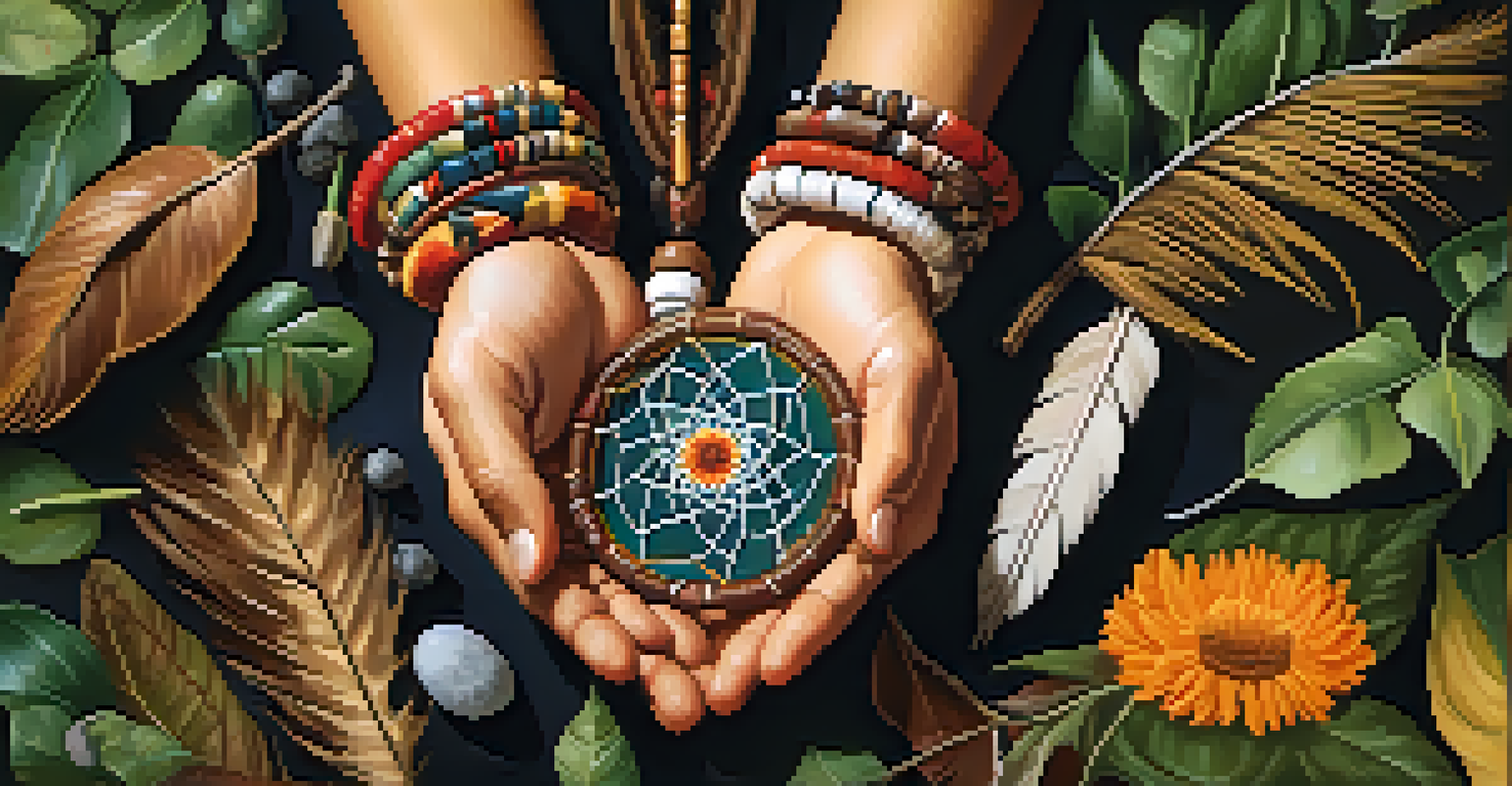Decolonizing Psychedelic Practices: A Call to Action

Understanding the Roots of Psychedelic Practices
Psychedelic practices have deep cultural roots, especially within Indigenous communities. These practices often involve the use of natural substances like ayahuasca and peyote, which have been integral to spiritual and healing rituals for centuries. Understanding these roots helps us appreciate the rich histories and traditions that surround these substances.
We must recognize that the roots of all that we are is tied to the land and the wisdom of our ancestors.
However, as psychedelics gain popularity in Western culture, their origins are frequently overlooked. This disconnection can lead to the commodification of these sacred practices, stripping them of their meaning and significance. By recognizing the historical context, we can work towards a more respectful approach to using psychedelics.
Decolonizing these practices means acknowledging and honoring the Indigenous knowledge and traditions associated with them. It's essential to create a dialogue that includes Indigenous voices and perspectives, promoting a more equitable and respectful appreciation of their cultural significance.
The Impact of Colonialism on Psychedelic Practices
Colonialism has had a profound effect on Indigenous cultures, including their traditional psychedelic practices. The suppression of these practices often came hand-in-hand with the erasure of cultural identities and knowledge systems. This historical trauma continues to impact Indigenous communities today, making it crucial to address these issues in our conversations about psychedelics.

As Western societies embrace psychedelics for therapeutic and recreational purposes, we must reflect on the colonial roots of these practices. Many Indigenous peoples view this appropriation as a form of cultural theft, which perpetuates ongoing inequalities. Acknowledging this history is vital for fostering understanding and respect.
Honor Indigenous Roots in Psychedelics
Understanding the cultural significance of psychedelics can foster respect and appreciation for Indigenous practices.
By recognizing the impact of colonialism, we can begin to dismantle the harmful narratives that have dominated the discourse around psychedelics. This involves not only honoring Indigenous practices but also actively working to support and uplift these communities in their healing journeys.
The Role of Indigenous Knowledge in Healing
Indigenous knowledge systems have a unique approach to healing that incorporates a deep connection to nature and spirituality. These systems often view mental health not just as an individual issue but as a communal one, emphasizing the importance of relationships and community support. This holistic perspective can offer valuable insights for contemporary practices in mental health and wellness.
Cultural appropriation is the act of taking or borrowing elements from a culture without permission or understanding, often stripping them of their original meaning.
Psychedelics, when used in their traditional contexts, are often accompanied by cultural rituals that enhance their healing potential. These rituals create a safe space for participants, fostering a sense of belonging and understanding. By integrating Indigenous practices into modern psychedelic therapy, we can create a more inclusive and effective healing environment.
Recognizing the importance of Indigenous knowledge in healing not only honors these traditions but also enriches our understanding of psychedelics. It encourages a collaborative approach that values diverse perspectives and experiences, ultimately leading to more effective and meaningful practices.
Advocating for Ethical Practices in Psychedelic Therapy
As the legalization of psychedelics expands, the need for ethical considerations becomes increasingly important. Ethical practices in psychedelic therapy should prioritize informed consent, cultural sensitivity, and community engagement. This can help prevent the exploitation of Indigenous cultures and ensure that their knowledge is respected.
Therapists and practitioners must educate themselves about the cultural significance of the substances they work with. This includes understanding the historical contexts and contemporary struggles faced by Indigenous communities. By doing so, practitioners can foster a more respectful and collaborative therapeutic environment.
Address Colonial Impact on Practices
Recognizing the effects of colonialism is essential to dismantling harmful narratives and promoting equity in psychedelic use.
Advocating for ethical practices also means supporting Indigenous-led initiatives and movements. This can involve amplifying their voices in the conversation around psychedelics and ensuring they have a seat at the table when it comes to shaping policies and practices.
Creating Alliances with Indigenous Communities
Forming alliances with Indigenous communities is crucial for the decolonization of psychedelic practices. These partnerships can foster mutual learning, respect, and support, creating a more equitable landscape for all involved. By working together, both Indigenous and non-Indigenous individuals can share knowledge and resources for healing and understanding.
Building trust is essential in these alliances, which requires active listening and a commitment to understanding Indigenous perspectives. This means acknowledging past harms and being willing to take responsibility for our actions. Collaborative efforts can lead to innovative approaches that honor both traditional practices and contemporary needs.
By forging strong alliances, we can elevate Indigenous voices and ensure their wisdom is integrated into the broader conversation about psychedelics. This partnership can also empower Indigenous communities to reclaim their cultural practices and navigate the complexities of modern psychedelic use.
The Importance of Education and Awareness
Education plays a vital role in decolonizing psychedelic practices. By raising awareness about the historical contexts and cultural significance of these substances, we can foster a more respectful understanding of their use. This education should extend beyond academic settings and into community discussions, ensuring that diverse voices are heard.
Workshops, seminars, and community events can serve as platforms for sharing knowledge and experiences related to psychedelics. These gatherings can help bridge the gap between Indigenous knowledge and modern therapeutic practices, creating a space for dialogue and collaboration. Engaging with diverse perspectives enriches our understanding and helps combat misconceptions.
Advocate for Ethical Psychedelic Therapy
Promoting ethical practices in psychedelic therapy is crucial to respecting Indigenous knowledge and ensuring community engagement.
Ultimately, fostering education and awareness is a collective responsibility. By prioritizing inclusive conversations and promoting cultural sensitivity, we can create a more informed society that respects and honors the roots of psychedelic practices.
A Call to Action for Decolonization
Decolonizing psychedelic practices is not just a theoretical discussion; it requires actionable steps from all of us. This includes actively supporting Indigenous communities, advocating for their rights, and prioritizing their voices in the ongoing conversation about psychedelics. We must commit to being allies in this movement for justice and equity.
Engaging with Indigenous-led organizations and initiatives is one way to make a tangible impact. This support can range from participating in community events to donating resources or time to help amplify their efforts. Every action counts in the broader goal of decolonization.

As we navigate the evolving landscape of psychedelics, let’s commit to fostering a culture of respect and collaboration. By acknowledging the past and working towards a more equitable future, we can honor the rich traditions and knowledge that surround these powerful substances.